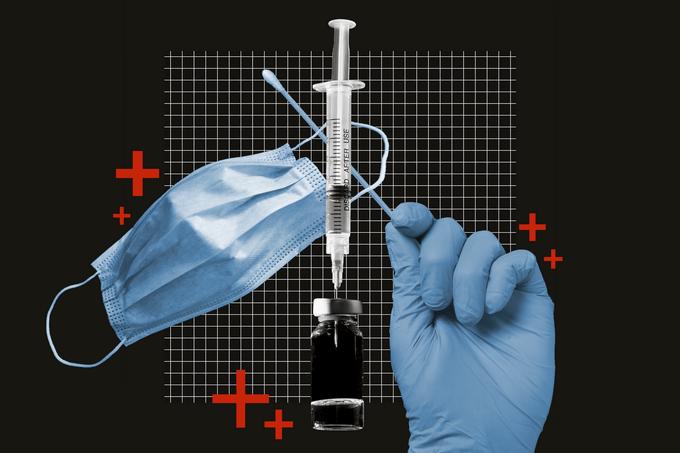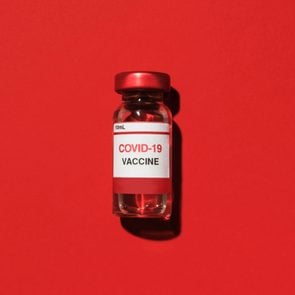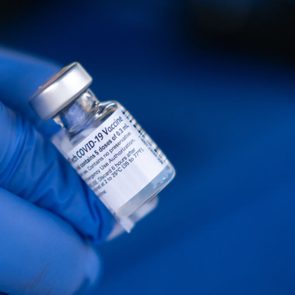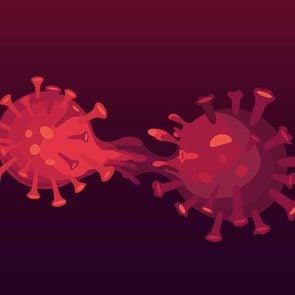Can You Test Positive for Covid-19 After Getting the Vaccine?
Updated: Mar. 30, 2022
If you got the Covid-19 vaccine, you're not in the clear just yet. Here are the possible scenarios where you can still test positive for Covid after being vaccinated.
Covid-19 vaccine and testing positive
After surviving a full year of a highly contagious and deadly virus, the development of not one but two new Covid-19 vaccines brings a glimmer of hope. The rollout has been slow, but there are groups of people—the elderly and essential workers—who have received one or two of their Covid-19 shots. And, when enough people are fully vaccinated, we’ll ideally achieve herd immunity. This means the virus is likely to spread less, have nowhere to go, and eventually die down or die out. It’s still unclear how much of the population needs to be vaccinated to achieve this.
However, before most of the population is inoculated, and even then, you still need to exercise caution. You still can test positive for Covid-19 after getting the vaccine, but there are a lot of factors that come into play. Here’s what you need to know about the vaccine, how it works, and the possible scenarios where you can test positive.
(Find out when the Covid-19 vaccine will reach you.)
How effective are the Covid-19 vaccines, and are they safe?
The Covid-19 vaccines have a remarkably high-efficiency rate and have been rigorously tested for safety (so you can ignore the Covid-19 vaccine myths that state otherwise.)
A 2020 study on the Pfizer vaccine of more than 43,000 participants published in The New England Journal of Medicine (NEJM), found the vaccine was 95 percent effective at preventing Covid-19. There were only minor side effects and very few severe adverse reactions. A 2020 trial of over 30,000 participants for the Moderna vaccine, published in the NEJM, found similar results: The vaccine was 94 percent effective, with very rare serious adverse events. (Moderna vs. Pfizer: here’s what you need to know.)
“Pfizer and Moderna data suggest that the vaccines are both approximately 95 percent effective at preventing people from getting symptomatic Covid-19, and are particularly effective at preventing severe disease,” says Anne Rimoin, a professor of epidemiology at UCLA Fielding School of Public Health. For comparison, last season’s flu vaccine was 45 percent effective, according to the Centers for Disease Control and Prevention (CDC).
In order to be approved, the known and potential benefits of a Covid-19 vaccine must outweigh the known and potential risks of the vaccine, says the CDC. That means you can be confident of the vaccine’s safety and comfortably ignore any Covid-19 conspiracy theories. However, if you are pregnant or have had allergic reactions to vaccines, talk to your doctor to discuss whether you should skip the Covid-19 vaccine.
How do the vaccines work to prevent Covid-19?
The Covid vaccines are “messenger RNA” vaccines, or “mRNA,” that signal your body to make a harmless version of the spike protein found in Covid-19. Then, your body recognizes the protein as an invader, destroys it as well as the messenger that brought it, and remembers the protein so it can fight it later. Even though the vaccine uses RNA, it does not change any of your DNA because the RNA never enters the nucleus of your cells, where your genetic material (DNA) is kept.
Scientists have been working on mRNA vaccines for a long time, which is in part why they were able to create these vaccines for Covid so quickly.
(Here are some vaccine facts you should know.)
Can I get Covid from the vaccine?
No. There is no Covid virus in the vaccine, so you cannot test positive for Covid or get sick with Covid from the shot itself. In response to the spike protein, “the vaccine induces immune responses—both antibodies and cellular immunity,” says Stanley H. Weiss, MD, an epidemiologist and professor at Rutgers New Jersey Medical School and the department of biostatistics and epidemiology, Rutgers School of Public Health.
Cellular immunity refers to the activation of T-cells, which are white blood cells that also help fight the virus. Although this cellular immunity is likely to be very important, Dr. Weiss says, “most of what is known for the mRNA vaccines relates to the antibodies they induce.”
So, because your body will develop the antibodies to fight off the virus in the future, you could potentially test positive on an antibody test; but not on a test for the virus.
(Find out if you need the vaccine if you’ve already had Covid-19.)

How could I get Covid after being vaccinated?
There are a couple of ways this could happen. First, you could unknowingly already be infected with Covid before you receive the first (or even the second) dose, and subsequently test positive. “It will take several weeks for your body to build optimal immunity after vaccination,” says Rimoin.
“That means it’s possible a person could be infected with the virus that causes Covid-19 just before or just after vaccination. This is because the vaccine has not had enough time to provide protection. This is why it is critical that everyone remain vigilant [about masks and social distancing], even after vaccination,” he says.
(Here’s how long you can test positive for Covid-19 after infection.)
Another possibility: Because your first dose isn’t fully protective (the NEJM study on the Pfizer vaccine showed that the first jab was only 52 percent effective), you could still catch Covid in between your two shots.
“There is some protection starting 10 days after the first dose, but clearly limited,” Dr. Weiss says. “About 10 to 14 days after the second dose there is a dramatic increase in protection as evidenced by much higher antibody titers [the amount of antibodies],” he explains.
(Here’s what it’s like to volunteer in a Covid-19 vaccine trial.)
Can you still get Covid after both doses?
Even after two doses, before we reach herd immunity, there’s still some chance of getting sick. “The meaning of ’95 percent efficacy’ is that some people who had both vaccine doses still got Covid-19 disease; namely, 100 percent minus 95 is five percent that were observed to have disease,” Dr. Weiss says. That’s one in 20 people.
In addition, the studies only looked at people with an observable illness. “If everyone were tested, almost surely cases of asymptomatic infection would have been detected beyond those five percent,” he says. So, people “need to remain as vigilant after the first dose of the mRNA vaccines, but also remain vigilant after the second dose.”
Importantly, though, Dr. Weiss points out that among the five percent who did get sick, there was also an “absence of deaths,” which indicates Covid is much less severe after vaccination.
(Find out if you can drink alcohol before or after getting the Covid-19 vaccine.)
Can I still transmit the virus after being vaccinated?
Unfortunately, scientists don’t know yet. “We are still trying to understand whether or not a person can still become infected and pass the virus on to others,” Rimoin says.
“There’s not enough evidence yet on whether the vaccines also prevent asymptomatic infection and transmission. There are still ongoing studies that will answer this question. Until we know the answers we should continue to be as cautious as possible.”
Dr. Weiss agrees those who have been vaccinated should be cautioned that it’s possible they could potentially transmit the virus. “We have seen that phenomenon with some other infectious agents, so it will be important to examine this issue for Covid-19,” he says. Because there are so many asymptomatic cases of Covid-19 (more than with other viruses), it could still be possible to spread it after vaccination without actually being sick; although the likelihood of this is unclear.
The CDC notes that the vaccines need to be studied further in “real-world” conditions—not just in clinical trials—in order to know more.
Will the vaccine protect against new variants?
Again, scientists and doctors just aren’t totally sure how the vaccines will work against the Covid-19 mutated versions of the virus that are coming from other countries including the U.K., South Africa, and Brazil.
“It is important for scientists to monitor their development and investigate these variants—Moderna just released a statement that in their studies [not yet peer reviewed], the current vaccine likely protects about as well for the U.K. variant,” Dr. Weiss says.
“The vaccine also provides protection against the South African variant, but the immunologic data suggest it may be somewhat less protective, perhaps in the range of 85 percent,” he says. The possibilities of a booster dose or a new vaccine that works against multiple strains are also under consideration, he says.
Is it still worth getting the vaccine?
Absolutely. Although there are still unknowns, what’s certain is that Covid is a deadly disease, and the vaccine is a safe and effective way to avoid getting sick. Plus, getting vaccinated is the only way for things to return to some sense of normalcy—eventually.
“After a sufficient portion of the overall population has received full vaccination regimens, the general risk will decrease in the population,” Dr. Weiss says. “Estimates range from 75 to 90 percent of persons needed to be vaccinated to reach ‘herd immunity.’ The reason that this level of immunization needed to achieve herd immunity is higher than in initial estimates is that the variants are more transmissible than the original pandemic strain,” he says. Check out these Covid-19 vaccine stories from people who agree it’s worth it.
What will life be like after I get the vaccine?
For now, the recommendations are still to wear masks and social distance, although you might feel better about socializing with others who’ve also been fully vaccinated. However, remember that young and healthy people (except essential workers) have not yet begun to receive the vaccine; and a vaccine for kids is still in the works.
“Nothing will change until we can be 100 percent sure that we’re not going to be spreading to others,” Rimoin says.
“Even after getting vaccinated, if a person is exposed to the SARS-CoV-2 virus it can take the body’s immune response some time to control infection. In the interim, we will still need to do all the things we know prevent spread: wearing a mask, hand hygiene, and social distancing,” he says.
Again, “95 percent efficacy is not 100 percent, so the person remains at risk for acquiring infection,” until we reach herd immunity, Dr. Weiss says. “They also might pass it on—we don’t know. Thus, those who receive the vaccine, even after two doses, should continue to wear masks,” he says.
The bottom line? Get the vaccine, and don’t get discouraged—with continued efforts to get everyone vaccinated, science is on the right path.
Next, learn how to get the Covid-19 vaccine.



